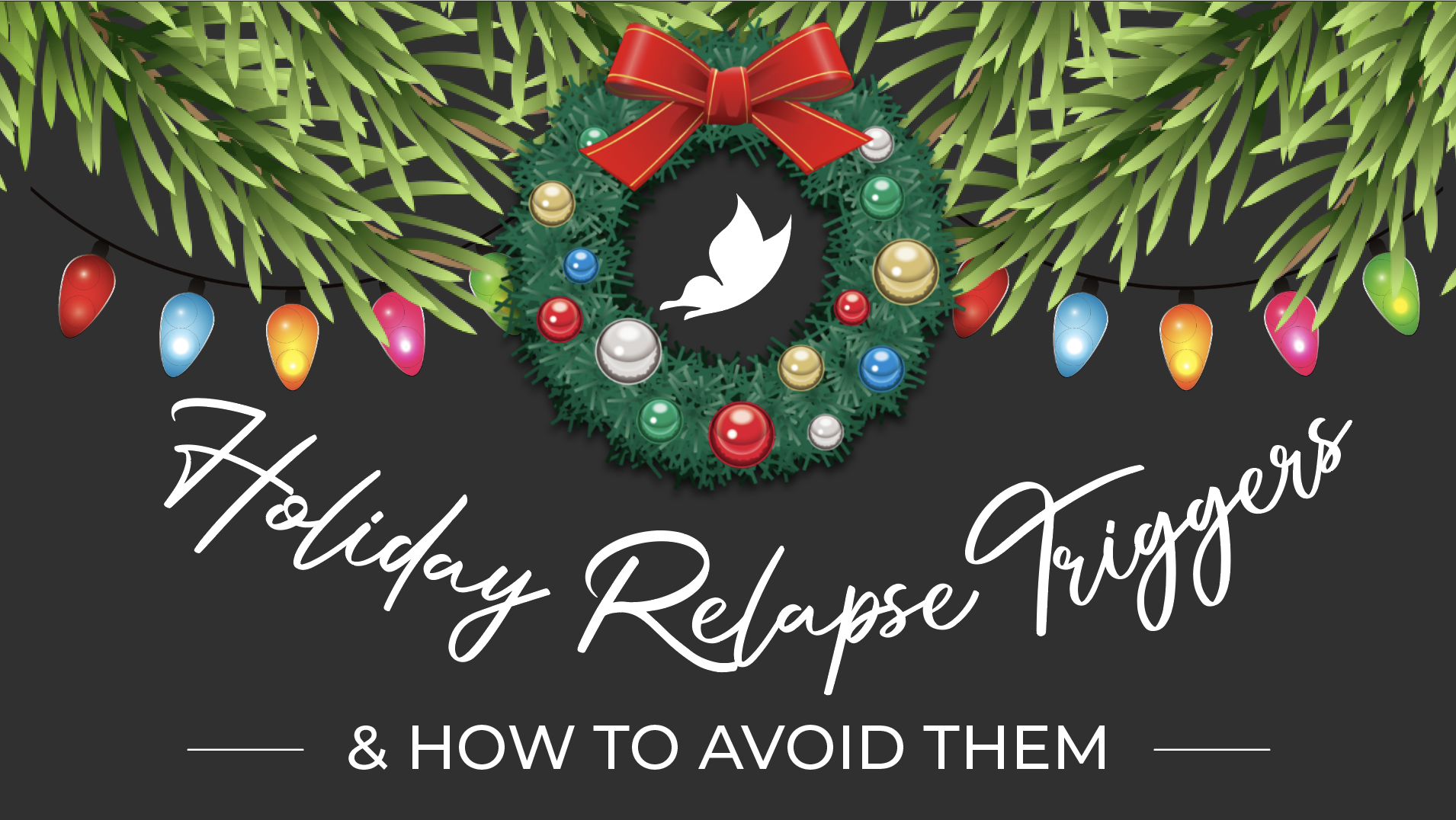If you’re in recovery from substance abuse, be wary of the holiday season. The holidays, and all the chaos and merriment that surrounds them, can easily derail you if you don’t take active steps to defend against relapse. Whether you’ve noticed or not, your routine and the consistent structure of your day are the pillars of recovery. Holidays disrupt routine and upend structure, so they can be a threat to your progress.
Seven Holiday Relapse Triggers to Avoid
- Holiday gatherings
Parties, dinners and get-togethers are common during this season. And while holiday gatherings deliver lots of fun they can also introduce temptations and peer pressure to indulge in alcohol or drug use. Attending a party, whether it’s at a bar or someone’s home, could put you in an uncomfortable situation. The best thing to do is have a plan. Be prepared to leave if you feel triggered. Plan on only staying for a set amount of time. Consider bringing a supportive friend and know what you’re going to say if someone invites you to use a substance. The answer is no.
- Stressful family encounters
If you spend holidays with family members then you likely know who can be stressful to see. Let’s be honest, some relationships can be toxic, and being around these people may lead to awkward moments and bad feelings. So be sure you focus on yourself. If you find a family member making you feel uncomfortable don’t be afraid to leave the situation. Remember what you’ve accomplished through recovery and use the training you’ve gotten to control your emotions.
- Traveling
Travel can also be stressful and tiresome, albeit inevitable sometimes. When you have to travel be sure you’re getting plenty of sleep and plenty to eat. Staying energized can help you avoid making impulsive decisions and keep you in a good frame of mind while on the road. But getting from point A to point B can be stressful, no matter how smooth the trip goes. So make sure you plan out your trip well in advance. Know exactly what time you need to leave, and when you expect to arrive. Plan on delays and know how you’re going to deal with them.
- Traditions with friends and family involving alcohol or drugs
Don’t get involved with friends or family with whom you used to enjoy your substance of choice either. Perhaps you and a group of loved ones have a tradition of toking up on Christmas or drinking a lot on New Year’s for example. Even if it’s not the substance you quit, it’s a gateway to relapse or even cross-addiction. The best thing to do is to avoid these situations entirely. If for some reason, though, the problem is unavoidable, you’ve still got to have enough resolve to plan ahead of time for how you’ll stay committed to your own recovery. Again, steer clear of these situations altogether as best as possible.
- Pressure to appear successful
Don’t get sucked into the one-upmanship of being around siblings, cousins and the like. It’s just another source of stress. The first assessment you need to make is whether or not you can even handle this kind of stress right now and stay even-keel enough to abstain from using. If not, you shouldn’t attend whatever family gathering this may be. If you do go, though, it’s important to make sure you’re already very comfortable with the progress you’re making in life, particularly when it comes to conquering your addiction. Come prepared to brandish your recovery journey as its own reward. Remember that beating addiction is inherently better than some career move or new car. You have a lot to be proud of.
- Reminiscing about past holidays
Try not to dwell too much on past holidays either, particularly those attached to intense emotions like loneliness, grief or depression. Past holidays can be a sore spot for some. You may remember a time when you were homeless on Christmas for example, which happens to far more people than you might think. You might recall that someone close to you passed around New Year’s. Don’t let depression take hold because that’s what weakens your resolve.
It’ll hold you back from maintaining recovery through the holiday season. You might not be one who necessarily has negative memories associated with these holidays, though. Rather, you might be among those who remember these holidays as times when you indulged in substance abuse. That’s just another reason to keep your mind focused on the present. That also means avoiding anyone who’s going to automatically remind you of the past you shouldn’t be thinking about so much.
- Spending extra money
Lastly, to the best of your ability, try not to spend extra money beyond what you’ve budgeted for the month. Even if you’re able to do so, knowing that you’re over-extending is stressful in and of itself. This is, perhaps, the greatest stressor of the holiday season in many households. It drives people to seek stress-relief anywhere they can find it. That’s what makes people grasp hold of the nearest coping mechanism. If you can stay frugal during the holidays, you’ll likely reduce your stress level significantly. It’ll be safer for you.
Routine vs. Relapse
If your time is structured and repetitive, you have a better chance of sustaining recovery than the version of you who’s flying by the seat of your pants. Tempest – a growing, virtual addiction recovery program recognized by Fast Company in 2021 – emphasizes the importance of routine in recovery.
“Morning rituals create structure. They set a destination for your mind right upon awakening–something extremely important for those of us prone to escapism,” writes Jacqui Hathaway Levin for Tempest.
Unfortunately though, the holiday season seems to present incessant disruptions to your daily routine. If you’re fresh out of rehab or if you’ve already been at it for several months, your first holiday season is going to be a challenge.
Pandemic Proof
The pandemic was already its own disruptor, and it coincided with rampant increases in overdose. There were 91,799 drug overdose deaths in the U.S. in 2020, a 30% increase from 2019 according to the Centers for Disease Control and Prevention. The CDC even reported that the uptick started accelerating in March 2020.
In order to combat addiction, though, you have to occupy your mind. Idle hands can’t be trusted.
How to Sustain a Recovery Routine
It’s recommended that you plan ahead by several weeks in order to make sure that you keep up with appointments. If you’ve got meetings to go to, they’re among the most important parts of your routine. Don’t let the holidays throw you off your game.
Tempest particularly recommends morning rituals be implemented. Theoretically, morning rituals are an excellent way to ensure that you’re never idle in the day. The morning is when you’re most likely to idle, and idling commonly leads to contemplating bad decisions.
If you can start your day with a defined set of actions that must be taken, you leave yourself no room to think about doing anything else. This also sets the tone for the rest of your day, which should ideally be scheduled in like manner. You’ve started yourself off with momentum against succumbing to relapse.
Activities as Building Blocks for a Routine
Jocellyn Harvey, a certified success coach and author of Recovering the Home, makes several recommendations for activities to get you started. She recommends starting your day by reading, going on walks or writing gratitude lists. While the latter is unique and innovative, another that’s less so is watching TV.
While Harvey spoke of TV working for her apropos of controlling her mood early, it should be noted that some activities like this can also double as triggers for people depending on what their use habits were. If you commonly watched certain channels, programs, or videos when you drank or got high, then you might need to keep your distance from those things.
How Holidays Impact Routines
During the holidays, you’re likely to have all sorts of interruptions. It’ll be harder to sustain your routine. You can’t really do everything you normally do if you’re suddenly obligated to attend a family gathering.
If you go to the gym in the mornings, being out of town and not knowing where the nearest gym is would pose a problem for your morning routine for example. This is increasingly important when you factor in the level of stress incurred during the holidays for some people.
“Family gatherings are a source of joy for many but they can also be a time of great stress,” said Jeremy Martin, vice president of treatment and intervention services at the Lexington/Richland Alcohol and Drug Abuse Council (LRADC). “From being around toxic relatives to reliving memories of unpleasant events from the past, be aware of the stress these get-togethers can cause and set your own personal boundaries on how to cope. Either politely decline to attend, limit your participation, and do not engage in toxic or uncomfortable behavior.”
The LRADAC is the designated alcohol and drug abuse authority for Lexington and Richland Counties of South Carolina.
If you or someone you know is struggling with substance abuse this holiday season, don’t walk; run to Landmark Recovery or call 888.448.0302. This is a detrimental time for fatal overdose incidence. If you’re already in recovery, talk to our specialists about enrolling in our outpatient treatment program.

Choose Recovery Over Addiction
We're here 24/7 to help you get the care you need to live life on your terms, without drugs or alcohol. Talk to our recovery specialists today and learn about our integrated treatment programs.












